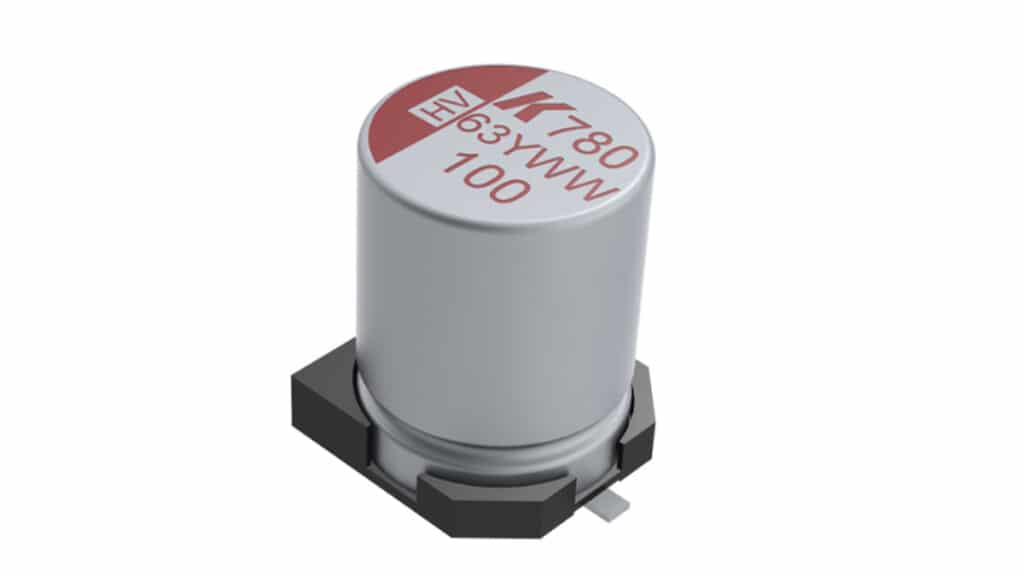KEMET is entering the aluminum hybrid electrolytic capacitors space with the launch of capacitors that will offer many benefits to the modern designer. This launch was made possible with recent advancements in the materials and construction of e-caps, which have yielded a new family of devices called aluminum hybrid polymer capacitors.
Like traditional e-caps, these devices use a wound structure of aluminum foil and paper in a metal can. Their novelty lies mainly in the electrolyte, a combination of traditional wet liquids and modern conductive polymers. The result is a device that has exceptionally low series resistance (ESR) and high reliability. A comparison of various capacitor topologies is shown below:
As can be seen in the above table, the performance of aluminum hybrid polymers are in the top tier across the board and can be used in environments that specifically require:
- Surface mount form factor
- Very low ESR
- High ripple current capability
- High temperature: 125°C/3,000 hours
- High vibration resistance up to 30 g
- REACH, RoHS compliant
- Halogen-free
Additionally, their exceptional performance and reliability allows the designer to use tighter margins for derating, often as small as 10%. This can, in turn, reduce the required component cost and level the overall design cost, even though the hybrid parts themselves are more expensive than traditional wet electrolytics. Several markets are particularly well-served by aluminum hybrid polymer e-caps: automotive, industrial, telecom / IT, and consumer electronics.
Automotive
Modern vehicles have very demanding power requirements along with complex electronic subsystems. In a gas or hybrid vehicle, alternator outputs and load conditions can vary dramatically. In electric vehicles, similar load variability and voltage regulation challenges exist. In both cases, onboard computers, engine control units, DC/DC converters, and 48V inverters require ripple stabilization and supply decoupling in harsh environmental conditions.
The automotive AEC–Q200 standard specifies the stress resistance requirements of electronic components used in vehicles to ensure safety and reliability. Aluminum hybrid polymer e-caps are an ideal fit in this scenario, where their low ESR provides the required electrical and temperature performance, and their unique construction allows for vibration resistance and a long lifetime through self-healing.
Industrial
The term “industrial” covers a wide variety of applications. In general, it refers to electronics that may exist in harsh conditions and be exposed to or used by equipment not found in typical residential settings. For example, many contract manufacturers have various automated assembly equipment, specialty lighting systems, machine vision systems, etc. These types of equipment are required to run for long periods with minimal downtime. They often contain subsystems like SMPS, DC/DC converters, computer voltage regulated modules, miniature high power supplies, and motor drives, to name a few. In these applications, ripple current capability enabled by low ESR is a critical performance parameter. In addition, lifetime operation and reliability are essential, not only from the monetary cost of component failure but also from safety implications. Aluminum hybrid polymer e-caps are an excellent fit for any industrial subsystem with onboard filtering and decoupling design.
Telecom / IT
The telecom / IT space poses a particularly interesting problem since the equipment is typically required to operate at elevated temperatures (racks and equipment rooms) without ever stopping. Servers, switches, routers, and modems are just a few examples where highly reliable power supplies and decoupling capacitors are required. The self-healing properties and high-temperature performance of aluminum hybrid polymer e-caps make them an ideal choice for these designs.
Consumer Electronics
While consumer electronics applications may not present the harsh environmental challenges discussed above, they still demand high reliability and safety levels. Also, size constraints often contradict with high capacitance requirements. Aluminum hybrid polymer e-caps are available in small surface-mount packages and offer an excellent combination of performance characteristics for most design requirements.
Aluminum hybrid polymer e-caps represent the latest advancement in capacitor technology and offer benefits across most application spaces. KEMET is entering the aluminum hybrid e-cap space with the launch of their new capacitors (part of the A780 series) that will initially include two values (56 µF and 100 µF) rated at 63 VDC.
